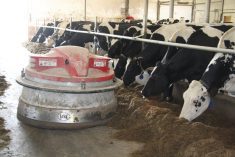By next year, operators of auction marts and livestock assembly stations in Manitoba will not be allowed to accept animals that are ill, injured or downed.
In September the provincial government unveiled amendments to Manitoba’s Animal Care Act. Under the new regulations, operators of livestock markets or assembly stations must refuse to accept an unfit animal for resale. The operator must report the refusal to Manitoba’s Office of the Chief Veterinarian.
The intent of the amendment, said Terry Whiting, manager of animal health and welfare for the province, is to shift responsibility for injured or ill animals back to the farm.
Read Also

Soybean market still figuring out implications of China-U.S. pact
Soybean futures had a muted reaction to the U.S. trade deal with China as the market tries to figure out the nuances of the deal.
“We want farmers to deal with disabled animals on the farm,” said Whiting during a presentation at the Manitoba Animal Welfare Conference in Portage la Prairie last week. “Previously the easiest person to prosecute was the trucker. The trucker is not the primary offender…. So, we want to move the pressure off the truckers and try to apply it where it is more appropriate.”
The new regulation won’t take effect until sometime next year because provincial officials are still working out the details around enforcement.
“The law is passed but we don’t have the paperwork in order yet,” Whiting said.
Following his presentation, Whiting was asked about compliance with the new law. Specifically, why would auction and assembly yard operators want to finger customers who delivered injured or ill livestock?
“That’s a difficult social problem,” Whiting said. “Their incentive to report is that it’s an offence to not report.”
The new regulation will make it difficult for auction marts to maintain good relations with cattle producers, said Jay Fox, president of the Manitoba Cattle Producers Association.
“The auction mart would have to start turning back clientele, which is a difficult thing to ask auction marts to do.”
More importantly, the regulation is addressing an issue that isn’t a significant problem in the province, Fox said.
“I would say 99.9 percent of producers don’t ever bring an animal that’s unfit for sale to town,” he said. “The only time those happen is when the animal is seemingly healthy at home and the stress of the transportation (an animal arrives ill or injured).”
However, it would be difficult to convince Twyla Francois, head of investigations for the Canadian Centre for Ethical Treatment of Food Animals, that downed and injured animals are not an issue in the province.
Several years ago, Francois audited the practices at three assembly stations and auction marts in Manitoba. During the investigation Francois said she witnessed multiple incidents where animals arrived injured, very ill or downed.
The new regulations are a step in the right direction, Francois said, but she remains skeptical that they will be enforced.
“We hope that industry does follow the (new) regulation but we don’t have huge amount of confidence that they will,” she said.
“Our sense is if no new inspectors have been hired to actually enforce this (amendment)… and if industry (is) allowed to completely regulate itself… what outcomes are likely in this case?”















